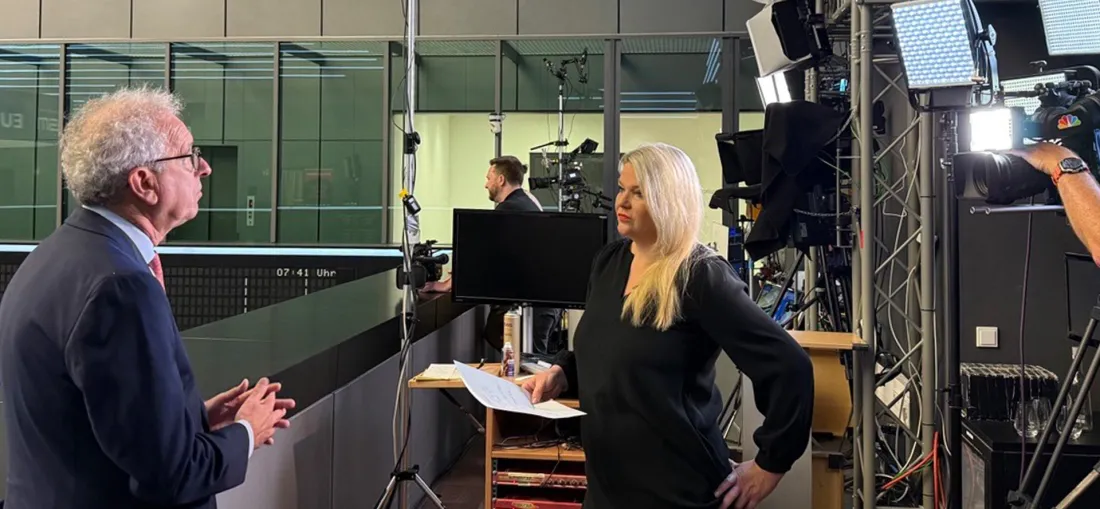Pierre Gramegna interviewed by CNBC at Frankfurt Stock Exchange

Transcript of interview with Pierre Gramegna, ESM Managing Director
CNBC, 15 May 2025
Interviewer: Annette Weisbach
CNBC: The first question is very short: why are you here in Frankfurt?
Pierre Gramegna: It's a pleasure to be here at the Stock Exchange of Frankfurt because today is a very important day for us, the European Stability Mechanism. As of today, we're going to do the clearing of interest rate swaps here in Frankfurt with Eurex.
And why does it matter for you?
It matters because we're doing this now in the euro area, and as such, we strengthen the attractiveness of investing in Europe and showing that Europe gets its act together to be more cohesive and more attractive, more competitive.
Let's talk a little a bit about Europe and the attractiveness of the place to invest because you also just came back from the IMF spring meetings and there was some doubt, I think, that US is still a safe haven. Can we be the new safe haven?
Well, that is very ambitious to be the new safe haven. But definitely, if there's so much uncertainty around the world, which is to a large extent triggered by economic policies or initiatives in the United States, investors are looking for other safe havens. I think Europe has an opportunity here that it should use. But in order to really fully build on this opportunity, we also have to do our homework, which means strengthening the single market, which we haven't updated for a long time. It is a success story, but needs updating, and we also need to deepen the capital markets union.
What is hindering actually the deepening of the capital markets union? We have been talking about this for many years. What's the action plan?
Well, the action plan is well known. Both in the Letta report on the single market or in the Draghi report, we're being told what we have to do. We need to have a deeper market. Let's face it, you asked me in the beginning if the dollar was not a safe haven any more. Let's be realistic. We had an episode a couple of weeks ago where there were some doubts, but the depth of the dollar market is huge. Unfortunately, our capital markets are still too fragmented. We know what we have to do. I think there are incentives to do it now because we realise that we are less competitive than we should be. The engines for growth are capital markets and having more equity because really we are lagging behind.
Yes, we are lagging behind funding and we are lagging behind, as you call it, the depth of the market, but also we are lagging in terms of competitiveness and perhaps attractiveness of the banking scene. What needs to be done here that European banks get more attractive for international investors?
Well, it is clear that we have much smaller banks than American ones, if you look at the top 10 list. We also need mergers, we need a framework that is conducive to investment. You're right to say that we have too little investment and too little innovation. Both things obviously go hand in hand.
We need deregulation for that or ... ?
Here, you're right. The word has been around now, and I think there's a distinction to make between deregulation and simplification. Because we shouldn't now do what often happens that the pendulum goes from one extreme to the other. So the European Commission has launched a simplification directive in many areas, also in green investments or sustainable investments and in lots of other ones, to encourage investment by companies and also make it easier for incoming investments from abroad. So I think it has been recognised and it's being delivered.
One other risk is, of course, cyber. We are seeing an increased amount of cyber-attacks. How crucial is that for financial stability and what are your plans here?
I think it's obvious that every actor that is operating in the field of IT, and that's basically all companies today, they need to be aware that cyber-attacks are there to stay and they're going to increase. A lot of investment is necessary in that area. I see a lot of potential there in Europe because we have a lot of know-how in Europe in cybersecurity. We at the ESM are top-notch there because obviously we manage hundreds of billions of euros in loans, and so we need to protect ourselves very well. We're very much aware of it and really advise our Member States to do the utmost in this area.
How important is that Italy is not ratifying the reforms [the revised ESM Treaty]?
Well, first of all, it's a pity because then we cannot activate the backstop to the Single Resolution Fund, which is an additional safety net for banks. But on the other hand, our treaty, our founding treaty is there. We have seven different financial instruments that we can use, and we are just doing a review of our toolkit to make sure that they are fit for purpose. So we are functioning despite that.
Thank you very much.
Author

Contacts


